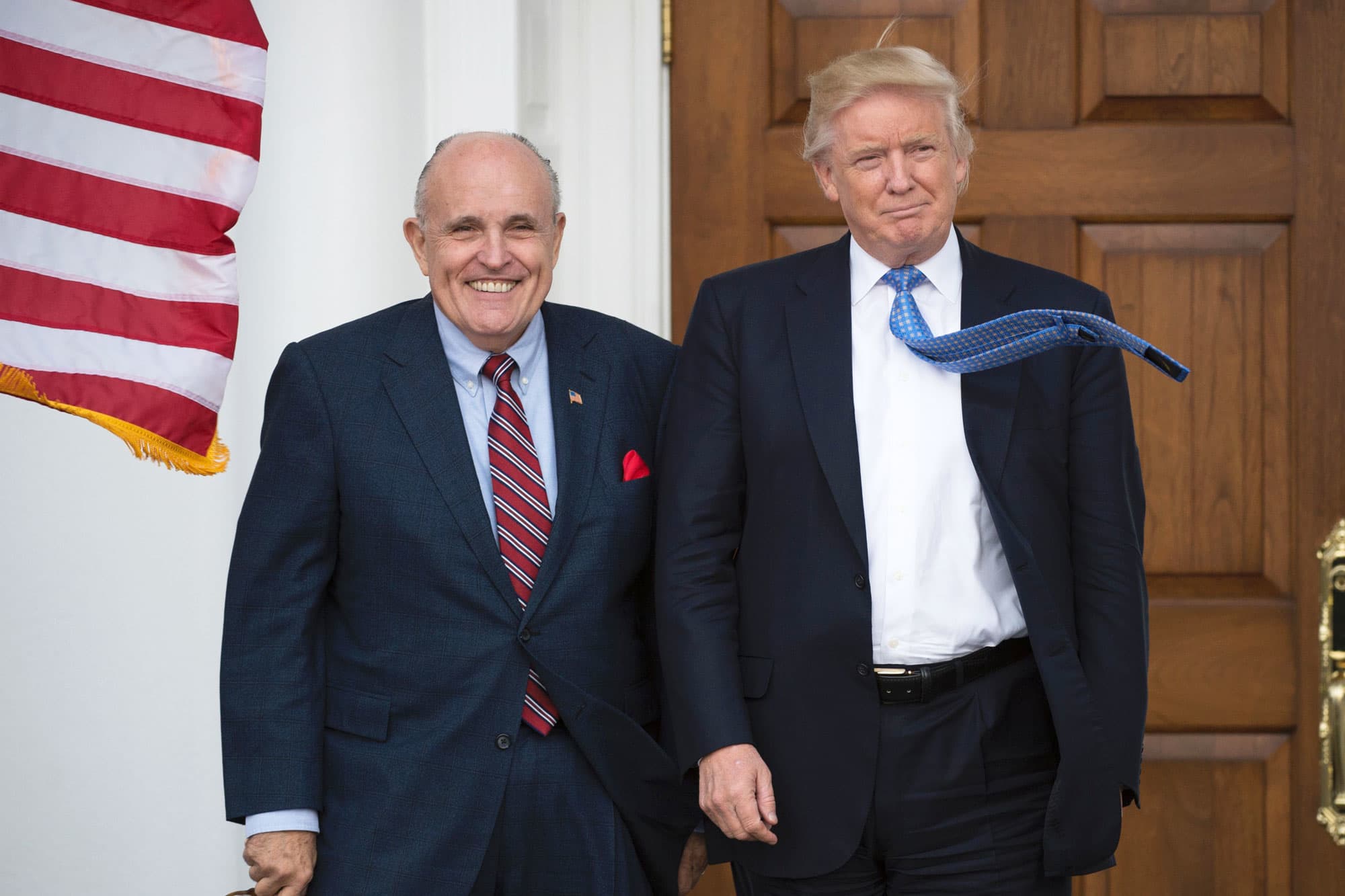Then-President-elect Donald Trump meets with former New York City Mayor Rudy Giuliani at the clubhouse of Trump National Golf Club November 20, 2016 in Bedminster, New Jersey.
Don Emmert | AFP | Getty Images
WASHINGTON — President Donald Trump on Tuesday denied that he had directed Rudy Giuliani, his personal attorney, to travel to Ukraine, where Giuliani met with government officials about investigations that Trump wanted.
Trump's claims are contradicted by months of statements from Giuliani and from Trump himself, as well as sworn testimony from nearly a dozen current and former national security officials in the ongoing House impeachment inquiry. It also prompted legal experts to question whether the president had waived attorney-client privilege.
During an interview, former Fox News Channel host Bill O'Reilly asked Trump what Giuliani was doing "in Ukraine on your behalf."
"Well, you have to ask that to Rudy, but Rudy, I don't, I don't even know," Trump replied. "I know he was going to go to Ukraine, and I think he canceled a trip. But, you know, Rudy has other clients other than me. I'm one person."
"So, you didn't direct him to go there on your behalf?" O'Reilly asked again.
"No, but you have to understand, Rudy is a great corruption fighter," Trump said.
Pressed by O'Reilly a third time, Trump again denied knowing about Giuliani's work there.
"No, I didn't direct him, but he's a warrior, Rudy's a warrior. Rudy went, he possibly saw something. But you have to understand, Rudy, has other people that he represents ... I think he's done work in Ukraine for years, I mean that's what I heard. I might have even read that someplace," the president said.
Robert Costello, an attorney for Giuliani, did not immediately reply to a request for comment from CNBC on the president's latest remarks about Giuliani's work.
Contradictory claims
In sworn testimony, former and current administration officials have said that Giuliani directly conveyed the president's demands to them that Ukraine launch investigations into the son of former Vice President Joe Biden and a 2016 election-related conspiracy. Those demands are now at the center of an impeachment inquiry into whether Trump abused the power of his office by freezing foreign aid to Ukraine in order to pressure the government to announce investigations.
Read more: Giuliani ally wants to testify that Nunes hid Ukraine meetings from Schiff
According to the White House's own rough transcript of Trump's July 25 call with Ukrainian President Volodymyr Zelenskiy, the president brought up Giuliani several times in the context of the investigations.
"Rudy very much knows what's happening, and he is a very capable guy. If you could speak to him that would be great," Trump said to Zelenskiy. "I will tell Rudy and Attorney General [Bill] Barr to call."
Meanwhile, Giuliani has also insisted for months that his work in Ukraine is being done solely to defend Trump, his client.
In early November, Giuliani wrote on Twitter, "The investigation I conducted concerning 2016 Ukrainian collusion and corruption, was done solely as a defense attorney to defend my client against false charges, that kept changing as one after another were disproven. The evidence, when revealed fully, will show that this present farce is as much a frame-up and hoax as Russian collusion, maybe worse, and will prove the President is innocent."
Questions of attorney-client privilege
Following Trump's comments, several legal experts raised the possibility that the president may have effectively waived any shield of attorney-client privilege that would have prevented Giuliani from publicly discussing the work he did for Trump in Ukraine.
Likewise, in the absence of an attorney-client relationship, Giuliani, a private citizen, would have little justification for refusing to testify in the impeachment inquiry. Giuliani was subpoenaed earlier this fall to testify, but defied the order by claiming that some of the documents requested by the committee were protected by attorney-client privilege.
The latest speculation about Trump and Giuliani's legal relationship follows months of debate in legal circles about whether Giuliani's work in Ukraine can even be considered "legal services," in order to meet the basic threshold for protection through attorney-client privilege.
Giuliani has claimed he was in Ukraine "defending" Trump against "false charges." But it's not clear what those charges were, and the president has not been charged with any crimes.
Moreover, if Giuliani were found to have been aiding the president in committing an illegal act, or helping him to plan an illegal act, then attorney-client privilege would be waived under what is known as the "crime-fraud exception," which prohibits lawyers from providing advice to clients about possible future crimes.
Giuliani under investigation
While Trump's comments about his personal attorney left many in Washington scratching their heads, they fit into the president's decades-long pattern of denying or downplaying his relationships with close associates who come under legal scrutiny.
Earlier in the week, The Wall Street Journal reported that subpoenas issued to several of Giuliani's associates name his eponymous firm, Giuliani Partners, in requests for information.The subpoenas appear to indicate that federal prosecutors in the Manhattan U.S. attorney's office, which Giuliani himself once headed, are investigating Giuliani's consulting business.
The subpoenas also revealed a list of potential charges under consideration in the probe. They include conspiracy to defraud the United States, money laundering, making false statements to the U.S. government, donating money from non-citizens to U.S. political campaigns, making so-called "straw man" campaign donations, mail fraud, and wire fraud.
Giuliani denied that he had committed any crimes and accused prosecutors of conspiring "to destroy my reputation so that I'm not credible when I continue to reveal all of the massive evidence" of wrongdoing in Ukraine.
A White House spokesman did not immediately respond to questions from CNBC about Trump's denial that Giuliani was working at his direction.
— CNBC's Yelena Dzhanova contributed to this report.
